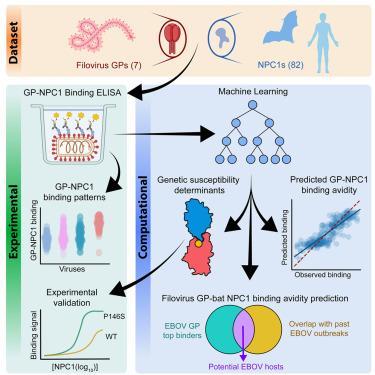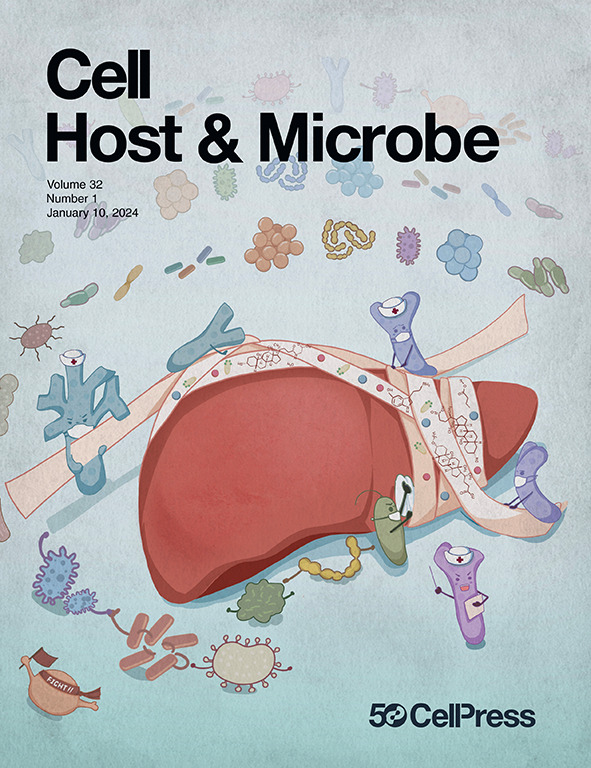Decoding the blueprint of receptor binding by filoviruses through large-scale binding assays and machine learning
IF 20.6
1区 医学
Q1 MICROBIOLOGY
引用次数: 0
Abstract
Evidence suggests that bats are important hosts of filoviruses, yet the specific species involved remain largely unidentified. Niemann-Pick C1 (NPC1) is an essential entry receptor, with amino acid variations influencing viral susceptibility and species-specific tropism. Herein, we conducted combinatorial binding studies with seven filovirus glycoproteins (GPs) and NPC1 orthologs from 81 bat species. We found that GP-NPC1 binding correlated poorly with phylogeny. By integrating binding assays with machine learning, we identified genetic factors influencing virus-receptor-binding and predicted GP-NPC1-binding avidity for additional filoviruses and bats. Moreover, combining receptor-binding avidities with bat geographic distribution and the locations of previous Ebola outbreaks allowed us to rank bats by their potential as Ebola virus hosts. This study represents a comprehensive investigation of filovirus-receptor binding in bats (1,484 GP-NPC1 pairs, 11 filoviruses, and 135 bats) and describes a multidisciplinary approach to predict susceptible species and guide filovirus host surveillance.

通过大规模结合实验和机器学习解码丝状病毒受体结合的蓝图
有证据表明,蝙蝠是丝状病毒的重要宿主,但涉及的具体物种在很大程度上仍未确定。Niemann-Pick C1 (NPC1)是一种必需的进入受体,其氨基酸变化影响病毒的易感性和物种特异性趋向性。在此,我们对来自81种蝙蝠的7种丝状病毒糖蛋白(GPs)和NPC1同源物进行了组合结合研究。我们发现GP-NPC1结合与系统发育相关性较差。通过结合实验和机器学习,我们确定了影响病毒受体结合的遗传因素,并预测了其他丝状病毒和蝙蝠的gp - npc1结合度。此外,将受体结合性与蝙蝠的地理分布以及以前埃博拉疫情爆发的地点相结合,使我们能够根据蝙蝠作为埃博拉病毒宿主的潜力对它们进行排名。本研究代表了对蝙蝠(1,484对GP-NPC1, 11种丝状病毒和135只蝙蝠)中丝状病毒受体结合的全面调查,并描述了一种多学科方法来预测易感物种和指导丝状病毒宿主监测。
本文章由计算机程序翻译,如有差异,请以英文原文为准。
求助全文
约1分钟内获得全文
求助全文
来源期刊

Cell host & microbe
生物-微生物学
CiteScore
45.10
自引率
1.70%
发文量
201
审稿时长
4-8 weeks
期刊介绍:
Cell Host & Microbe is a scientific journal that was launched in March 2007. The journal aims to provide a platform for scientists to exchange ideas and concepts related to the study of microbes and their interaction with host organisms at a molecular, cellular, and immune level. It publishes novel findings on a wide range of microorganisms including bacteria, fungi, parasites, and viruses. The journal focuses on the interface between the microbe and its host, whether the host is a vertebrate, invertebrate, or plant, and whether the microbe is pathogenic, non-pathogenic, or commensal. The integrated study of microbes and their interactions with each other, their host, and the cellular environment they inhabit is a unifying theme of the journal. The published work in Cell Host & Microbe is expected to be of exceptional significance within its field and also of interest to researchers in other areas. In addition to primary research articles, the journal features expert analysis, commentary, and reviews on current topics of interest in the field.
 求助内容:
求助内容: 应助结果提醒方式:
应助结果提醒方式:


